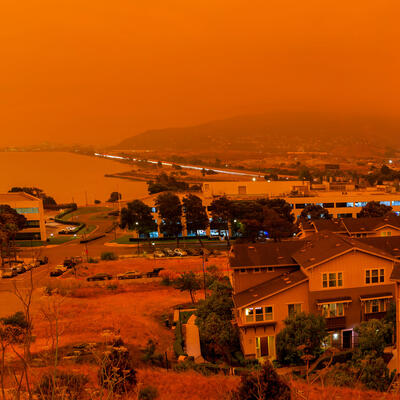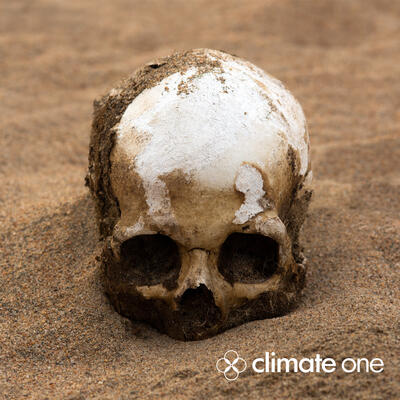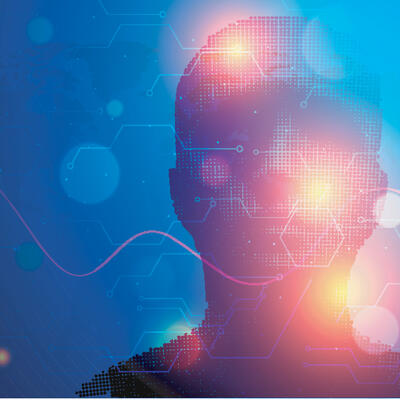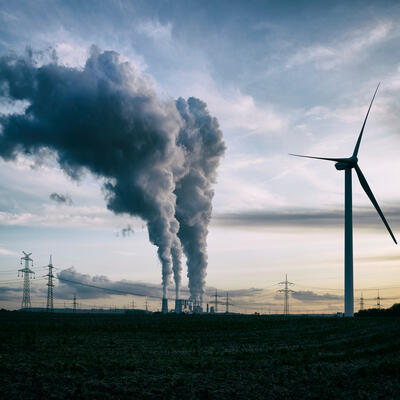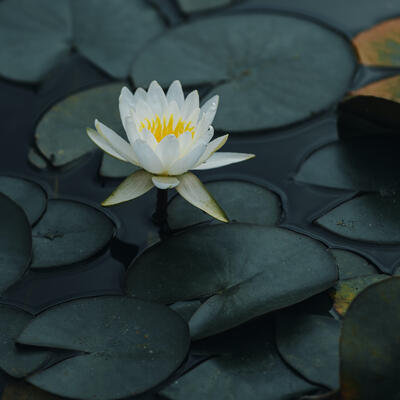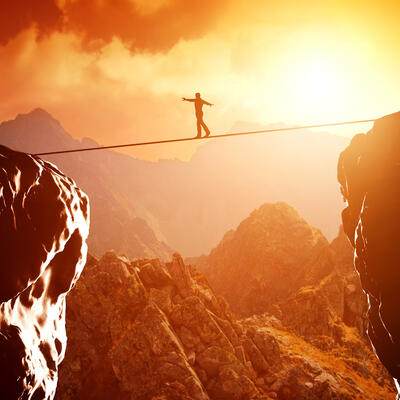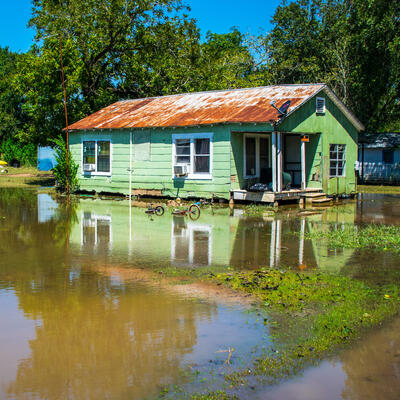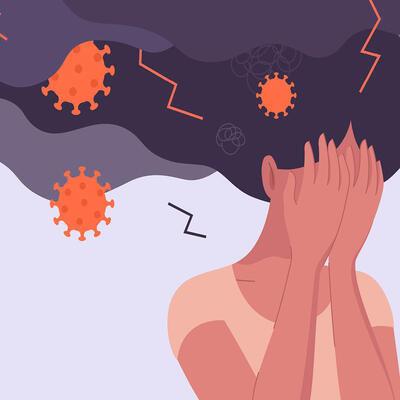
Coping with COVID and Climate Fatigue
Guests
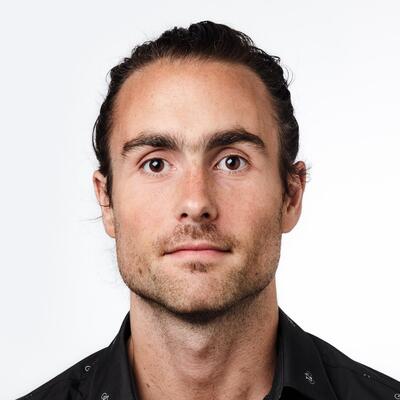
David Wallace-Wells
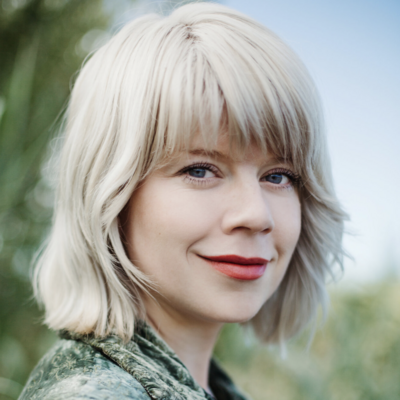
Britt Wray
Summary
Since March, 2020, the global community has grappled with an unprecedented pandemic. As COVID lockdowns were spreading, few people understood how the pandemic would upend both their lives and the global economy. Britt Wray, author and Human and Planetary Health Fellow at Stanford University, remembers exactly where she was when the lockdowns took effect.
“I was at a writing residency locked away from the world in order to crunch out some pages on this book about the emotional and psychological impact of the climate crisis. And while on the very day that we entered the house together it was the first time that I had ever practiced this new custom of not shaking hands physically with someone because we're aware that there was something in the air you should be a little bit concerned about...the next thing we know the WHO has called it a pandemic and we’re all leaving the residency and stopping early and not completing our program, etc. And it just felt like that home was my incubator space for watching the world kind of turn inside out into this new state.”
When the lockdowns started, most people were willing to do what it took to keep themselves and others safe. Two years in, the sentiment has undeniably changed. People are exhausted by the effort, and the general anxiety of living with COVID.
Simultaneously, the global community is facing an even larger existential threat: the growing climate crisis. For those fighting to stave off this slower-moving catastrophe, fatigue is a familiar feeling. What can we learn from dealing with COVID that can help us cope with climate catastrophe?
David Wallace-Wells, Editor-At-Large for New York Magazine, observes, “We’re learning that in fact we are very vulnerable, that we are as individuals, but certainly at the level of society. The permanent structures that we took for granted the stability, the security, the health security. All of those things are much more tentative and fragile than we believed was possible a couple of years ago. I think there are ways in which that may help educate us in our fight against climate but I worry about some of the opposite effects too that we might further cocoon ourselves once we feel like the pandemic is behind us and not really learn many of the lessons that the last couple of years should teach us if we looked at it with open eyes.”
Britt Wray explains how we process situations that seem to large to comprehend: “A philosopher named Timothy Morton had coined this term hyperobject to describe phenomena that actually extend beyond the normal category of what it means to be a thing because they are so vast and all-encompassing it’s really difficult to see where they start or stop. And when we can't see the boundaries of something because it's so overwhelming and vast like the climate crisis it can be difficult for us to identify a place for us to enter and intervene and make a change.”
Sometimes predictions create a fear that we won’t be able to handle the coming challenges, but Wallace-Wells points out, “If we have been talking about a future that was possible two or three decades from now and we said, there's a pretty good chance that the American West is gonna be in the worst drought that we've had in 1200 years that would probably strike us as pretty dark. And I don't mean to say that there are no negative impacts of the current drought; of course there are and things will get worse and the management of it will get harder. But…many people are living in California. Some people are dealing with water problems. The farms are, you know, there are problems. I don't mean to say there are none. But it is also the case that we are presently living through that drought. And that we are experiencing what seems on paper to be an unthinkable climate impact as something that's tough but survivable.”
Related Links:
The Uninhabitable Earth by David Wallace-Wells
Generation Dread by Britt Wray
Full Transcript
Greg Dalton: This is Climate One. I’m Greg Dalton. Two years ago as COVID lockdowns were spreading, few people understood how the pandemic would upend their lives and the global economy. Now, our eyes are opened to the realities we often ignored.
David Wallace-Wells: The permanent structures that we took for granted, the stability, the security, the health security. All of those things are much more tentative and fragile than we believed was possible a couple of years ago.
Greg Dalton: When we are faced with such gigantic, looming threats as global pandemics and climate catastrophe, where do we look for answers?
Britt Wray: I look at the survival of many communities that have been marginalized and oppressed, often intergenerationally when the future looked incredibly grim, right? But there are practices of continuance and pulling together to have that kind of robust form of hope to improve the conditions for one's own well-being.
Greg Dalton: Coping with COVID and Climate Fatigue. Up next on Climate One.
Greg Dalton: I’m Greg Dalton. Since March 2020 people around the world have been dealing with a pandemic more severe than most people knew was possible. At first, many were willing to follow guidelines, social distance, and do what was asked to keep themselves and others safe. Two years in, everyone feels exhausted by both the effort, and the general anxiety of living with COVID. Simultaneously, the global community faces an even greater existential threat: climate change. For those fighting the effects of this slower-moving catastrophe, fatigue is a familiar feeling. Given that COVID and climate change are both global crises with uneven impacts, what can we learn from how we deal with these evil twins? Britt Wray is a Human and Planetary Health Fellow at Stanford University and author of Generation Dread: Finding Purpose in an Age of Climate Crisis. David Wallace-Wells is Editor-At-Large for New York Magazine and author of The Uninhabitable Earth, a book about the terrifying impacts of burning fossil fuels. We recorded this conversation prior to Russia’s invasion of Ukraine, which created yet another humanitarian crisis that makes even people far from the war zone feel anxious and vulnerable. And if we’re feeling anxious and vulnerable, we can only imagine the grief and suffering on the ground in eastern Europe. David Wallace-Wells worried about the novel coronavirus before it had reached mainstream consciousness. I asked when it dawned on him that this virus was going to be a much bigger problem than many anticipated.
David Wallace-Wells: I think technically it might have been in early January it was just it was over the holidays, so it's a little hard to untangle which year it was. But really as soon as there were any warnings being issued out of China that the rest of the world was seeing they started to seem quite concerning to me. I'm not sure that I knew or felt or intuited it, even in a kind of panicky way that it was gonna be, you know, anything like the experience we've had global multiyear with more than 10 million people dying globally or anything like that. I probably thought it was gonna be something like SARS and MERS so it’s gonna be a major story in one part of the world which is not a part of the world that I was living in but it did feel like still a major event. And over the course of January as we sort of learned more about what was happening in China it started to get more concerning still than that and started to seem much more like a disease that was not gonna be containable in one region of the world. And I had an especially sort of eye-opening experience like I think a lot of people did just reading a particular Twitter thread by a scientist named Eric Feigl-Ding who was at Harvard and his critics will say he’s a nutritional epidemiologist, not an infectious disease epidemiologist which is true. And he wrote a long Twitter thread that was really full-on freak-out panic looking at some of the early data coming out of China. And in it he got a couple of data points wrong he did some, made some inaccurate comparisons, but the general spirit of that thread was like this is likely to be the most damaging destructive deadly pandemic that we've seen in generations, probably since the Spanish flu of 1918 and anybody who's treating it as a smaller threat than that has got their head in the sand. And this is a really interesting sort of moment for me and period for me because the immediate response to his very viral twitter thread was to have a lot of people who had more expertise in the area than he had sort of shouting him down and saying you’ve gotten this wrong you’ve gotten this wrong rather than looking at the holistic picture of the disease that he was presenting and saying okay there are a couple points in here we might've presented a little differently. But basically, you know the big picture is right, this is really scary. It's unlike anything we've seen in a very long time, and unless there's unbelievably dramatic action globally to contain this very quickly, its impact just gonna be beyond anything that anyone alive today has ever experienced before. And that prediction that sort of alarmist prophecy came true. And the sort of reassuring dismissive commentary from his colleagues, many of whom had more expertise than he did, did not come to pass, like their message was not validated by what followed. And over the course of the last couple of years he’s an interesting figure he continues to be quite an alarmist at almost every point of the pandemic he’s saying things are gonna be really bad. And he’s sort of misspoken or misestimated, you know, miscalibrated those warnings at a few points. But when you think of overall, you know, trying to look especially back at that set of warnings that he issued right at the beginning of the pandemic it strikes me that we were as a whole as we are often on climate far too complacent, far too trusting that our scientific expertise and technological wisdom will allow us to get out of the challenges that we see clearly in ways that don't even allow us to really see them all that clearly to begin with. We’re so invested in narratives of triumph and victory that we can't even really see a true threat when it's staring us right in the face. If you look at especially some countries in Asia there were measures that were taken that could've contained it like globally, especially all across the West Europe and in the Americas. We just weren’t willing to take any of those measures certainly preemptively which is probably what would've been necessary.
Greg Dalton: Britt, when COVID hit you were working in a house in a remote area with two other writers. You entered the house not shaking hands and during your time together the world changed. How did the reality of COVID gradually set in?
Britt Wray: Yes, I was at a writing residency locked away from the world in order to crunch out some pages on this book about the emotional and psychological impact of the climate crisis. And while on the very day that we entered the house together it was the first time that I had ever practiced this new custom of not shaking hands physically with someone because we're aware that there was something in the air you should be a little bit concerned about but also it was really an active politeness that people had ingrained into a new sense of biosecurity for their way of moving through the world. And little by little, you know, day after day we are meant to be there for some weeks but taking in the headlines as they rolled in to our devices in the morning and discussing, oh, okay, this is it seems to be increasingly urgent but we still don’t know how to make sense of it, you’ll remember that time is highly disorienting. And it wasn't until a day came when one of the other writers who was from Jordan started panicking and we needed to have an all-out mission to help her find a way to get a flight home so that she could ensure that she wouldn’t be separated from her child with what would surely be mass pandemonium with planes being grounded or flying in multiple strange directions that wouldn’t get you to your route etc. And in witnessing her flurry lifestyle change to end her time there at the residency try to get home and then you know the next thing we know the WHO has called it a pandemic and we’re all leaving the residency and stopping early and not completing our program, etc. And it just felt like in that home was my incubator space for watching the world kind of turn inside out into this new state. And it's quite a special highlight in the way that I think about and that was very clear to me while I was there working on this book about the climate crisis and its emotional impacts and how it messes with our minds maybe I needed to consider what going through that process inside of the pandemic with me to and of course not knowing how long this would last. It is now something that we have to interweave together.
Greg Dalton: Right. And David, you’ve written about cognitive biases that prevented people from understanding how serious coronavirus could become. We couldn't imagine the possible disruption to the global economies earlier attached to these narratives of triumph. We clung to what we knew to be true rather than the cognitive pain of reconceptualizing our world. Say more about that: this term hyperobject is being thrown around these days. Things are just so big we can't grok them.
David Wallace-Wells: Well, I think you know all of us in this conversation have lived lives of real privilege and I don't mean that in a narrow sense. I mean that we are relatively healthy when we are sick, we have access to good medical care even if many of those around us lack health insurance. All of these ways in which we live lives under a metanarrative of triumph over nature and independence of nature. And I think that's the most powerful thing that has been shaken for me with COVID even as it shook me with climate, which is to say I live my life feeling like the forces of the natural world did not pertain to me. And in both of these cases we're learning now sort of as Britt points out simultaneously in ways that are interwoven and making the solution to the other a little more challenging. We’re learning that in fact we are very vulnerable, that we are as individuals, but certainly at the level of society. The permanent structures that we took for granted the stability, the security, the health security. All of those things are much more tentative and fragile than we believed was possible a couple of years ago. I think there are ways in which that may help educate us in our fight against climate but I worry about some of the opposite effects too that we might further cocoon ourselves once we feel like the pandemic is behind us and not really learn many of the lessons that the last couple of years should teach us if we looked at it with open eyes.
Greg Dalton: Right. And Britt, I mentioned hyper-object. What is a hyperobject and how do these things kind of challenge our ability to process them and respond to them?
Britt Wray: So, a philosopher named Timothy Morton had coined this term hyperobject to describe phenomena that actually extend beyond the normal category of what it means to be a thing because they are so vast and all-encompassing it’s really difficult to see where they start or stop. And when we can't see the boundaries of something because it's so overwhelming and vast like the climate crisis it can be difficult for us to identify a place for us to enter and intervene and make a change. And so, the hyperobject of the climate crisis I mean, is something that we see when it is the plastic straw in our glass or our other recycling habits at home or the lack of political action from our leaders, or the ways that we vote. Our concerns about future generations, our perhaps experience of climate grief in the present moment. And so, all of that is part and parcel of how this crisis touches everything. And of course, the pandemic also touches similarly, many aspects of their lives reorienting how we go through our day, how we relate to each other, what we think about the future and how we’re re working and so on and so forth. So, hyperobjects are really the kind of fabric of our world at the moment in many ways, and we’re having to figure out how we can cope with them.
David Wallace-Wells: One of the interesting features of that to me is the way that we narrativize without having a full comprehensive picture. So, we tell ourselves stories about these experiences that we’re having, which are informed by parts of the hyperobjects which we can see and measure, but don't necessarily reflect the whole system as it's sort of pulling into view. I think that's been the case with both of these crises with the climate crisis and with COVID-19 that many of the things that we often tell ourselves either to comfort ourselves or to rile ourselves up or whatever the case may be. They may be helpful in strategic in certain local ways, but are also not precisely accurate as illustrations of the whole system because it's so hard for us to really take in the whole system at once.
Greg Dalton: You’re listening to a Climate One conversation about living with COVID and climate fatigue. Our podcasts typically contain extra content beyond what’s heard on the radio. If you missed a previous episode, or want to hear more of Climate One’s empowering conversations, subscribe to our podcast wherever you get your pods. Coming up, how do we deal with uncertainty in the face of global threats?
David Wallace-Wells: I'm really uncomfortable with uncertainty. I got really angry when those models seem wrong because I really wanted to know like what the next three weeks of the pandemic are gonna be like. And I think as a species, as a culture, as a civilization, as a country, we've gotten so addicted to a sense of certainty and confidence in our technocratic expertise…that any sense that those projections are just projections is really…disorienting and uncomfortable.
Greg Dalton: That’s up next, when Climate One continues.
Greg Dalton: This is Climate One. I’m Greg Dalton, and we’re talking about COVID and climate fatigue with Britt Wray and David Wallace-Wells. A lot of COVID and climate reporting is about the shape of curves projecting future problems. I asked David Wallace-Wells, known to be a data driven person, what comparisons and contrasts he sees between COVID and climate data.
David Wallace-Wells: Yeah, well, the thing that's been really striking to me following and covering the pandemic is how bad the models are. And I remember very vividly there was a moment in the winter surge in early 2021 when I was looking at the CDC website and they aggregate what they consider the 28 best forecasts of the next month or so of the pandemic. 28 different models and they also show if you aggregate them what the aggregate projections are but you can disaggregate them and look at them individually. And in the midst of that surge, which was the worst experience the US and much of the rest of the world had of COVID to that point and was not right at the start of the pandemic it was almost a year in so we should have learned quite a bit about the dynamics of spread. There are 28 models and the actual events in the real world two weeks after those projections were made fell outside of the 95% confidence interval of 26 of the 28 models. Which means, only two of the models that the CDC aggregated as saying the absolute best projections of the next few weeks even included the outcome as it eventually happened in the world. And the two that did include them, included them only at the fringes of their range of possibility. Which means basically what happened in the world was considered just about impossible and in 26 of 28 cases totally impossible by what were considered the best models of the CDC put forward. And we’ve seen this sort of time and time and time again throughout the pandemic where every time a wave or surge begins, we essentially see very simplistic projections of it’s basically gonna spread to the whole population and it’s gonna die. And it’s just has not been the case in any of these ways. And I don't mean to say that they've been uniformly bleaker in many cases, you know, they fail to predict upticks too. They’ve just been very bad guides to the medium-term future.
Greg Dalton: Does that say that since the COVID models were so repeatedly wrong does that make you worry that it's making people distrust climate models? Because that’s often hitting on models is often a critique from skeptics, deniers on the right.
David Wallace-Wells: Honestly, I think that not all that many Americans, not all that many people around the globe have been really paying attention to how faulty these models were. I think that they've just been following the curves in the newspaper in a day to day or week to week way and saying, okay, things are now getting better okay now things are getting worse. So, it feels a little bit more of a niche concern, but I think we had a sort of a similar not nearly as dramatic but a similar event or series of events happen around the Pacific heat dome last summer when a lot of climate modelers were saying, well, this is really far outside of our range of expectation. And of course, when we’re talking about models that project tons of weather outcomes as many climate models do. There are gonna be some crazily extreme outcomes that's not in and of itself so astonishing. But if we are having to approach those models with even more uncertainty and we came to them with a year or so ago and worry even more about extreme outcomes. That's quite scary. I'm somebody who’s navigated my own climate anxiety in part by relying on these models and saying okay we know we could get to some really bad places, but at least we have a sense of what those bad places look like because these models tell us what they will look like. The more that we start to think actually our experience of that future is gonna be defined much more by uncertainty than by apocalypse that may in certain ways be comforting, but in other ways it’s more disorienting because we don't know how to plan, we don't know how to calibrate our own emotional expectations. We just find ourselves flying blind. And if my experience personally, my experience of a pandemic is any guide or illustration, I'm really uncomfortable with uncertainty. I got really angry when those models seemed wrong because I really wanted to know like what the next three weeks of the pandemic are gonna be like. And I think as a species as a culture as a civilization as a country, we've gotten so addicted to a sense of certainty and confidence in our technocratic expertise especially those of us sort of in the, coastal liberal lead or whatever. That any sense that those projections are just projections is really as I say disorienting and uncomfortable. And I think that that's likely to be the state of our climate future very quickly. I have a lot of confidence in the climate models but that doesn't mean that everything that happens is gonna be predicted in any way. In fact, we’re gonna be surprised again and again and again. That's just what it means to live with the amount of uncertainty that are in all models.
Greg Dalton: Britt, let’s bring you in there on uncertainty. What I heard David say is in some ways uncertainty can be worse than a known bad future.
Britt Wray: I find that fascinating and it makes sense because it gives us an element of control which our minds crave so deeply, right. We have to do all kinds of mental gymnastics to be able to feel comfortable in any amount of uncertainty. And there are tools that we can apply to help ourselves deal with that to help our nervous systems relax with that awareness of our vulnerability. But it takes work and it's not automatic to a lot of us. It's kind of anti-intuitive. So, yeah, being able to grip on to the handlebars of models that at least outline what we can expect because knowledge is power and therefore we can resource ourselves, make some plans get together with our people and figure out what that scary feature is it’s coming at us and how we’re gonna build up some resilience and preparation for it, you know, that is helpful. At the same time, for me, I find that there is a huge analysis of possibility, that comes with uncertainty because it opens up space for potential for emergence. And I think that humans are, as David is saying, very terrible at predicting the future. Even sometimes with the best tools and measurements and technologies, right. And, I mean, I don’t know about you but I can certainly think back to tons of times in my life when I’ve said something about the future that was just so wrong. And in that sense, it's freeing to understand that many things will come that are currently inconceivable to us which of course includes a panoply of grim details that we'd rather not be part of our reality, but can also include much more regenerative and positive aspects of being human at this time as well. So, I look at the survival of many communities that have been marginalized and oppressed, often intergenerationally when the future looked incredibly grim, right? But there are practices of continuance and pulling together to have that kind of robust form of hope to improve the conditions for one's own well-being. Whether we’re talking about, you know, a variety of indigenous communities or the Black community in the US and other countries and what has happened in terms of fighting for rights and cultivating joy in its difficulty in producing better outcomes. And I think that that applies to all of us in the climate crisis too, which is where that kind of uncertainty and not giving up just because we don't know exactly what the future looks like is really a powerful place to draw the kind of strength that we need from.
Greg Dalton: And some of that anxiety we’ve talked about alarmism. And David, your book clearly rang an alarm and generated a lot of attention. Your initial article in 2017 created a lot of debate about is it too dark, you know, will that depress people and paralyze them. You said also that we in some ways overreacted to COVID. So, how do you see alarmism now compared when 4, 5 years ago?
David Wallace-Wells: Well, it's hard for me sometimes to separate my own like psychological journey on this question from the way that the world has evolved in parallel. I would say first of all that I have a somewhat less alarmist view of the science of climate change than I did a few years ago. I think that some of the worst-case scenarios now seem, if not impossible then considerably less likely than they did. When I wrote the article in 2017 and the book which came out in early 2019, now, I think where we’re headed and even our best-case scenarios involve a lot of climate suffering. And so, we shouldn’t tell ourselves that this is a happy story, exactly, but it is a relatively happy story of some of the truly most unimaginable horrors are looking less likely. I also think that is in part importantly, in part a result of activism and political awakening that came out of fear, you know, the sort of global political movement that emerged in the aftermath of the UN's 1.5° report which came out in 2018. So, I’m talking about Greta Thunberg but also all the other climate strikers all around the world talking about Sunrise in the US, Extinction Rebellion in the UK and all of the sort of shockwaves and reverberations that all those movements created outside of narrowly activist communities, but up through to prime ministers and presidents and CEOs and other C-suite executives. All of that is I think really the result of a growing sense of urgent climate anxiety that was much less present and much less widely held, then say you know five years ago 10 years ago than it is today. Now we’re in a place where the climate impacts are really arriving or seeing them in real time almost no matter where you live in the world whereas five or 10 years ago it was only in sort of the Global South the equatorial bands of the planet where you could really see those impacts clearly. Now almost no matter where you live, they’re very clear very obvious. We’re also living in a moment where politicians are at the rhetorical level paying lipservice to this crisis. think they’re not doing nearly enough about it, but we’re all sort of we move from a place in which we were thinking about how to think about a future threat to one in which it's now become a much more fundamental and quotidian feature of our everyday lives. And as results like the psychological dynamics there are a little bit different which is to say I don't know that the main even if I think alarmism is really useful in sort of bringing about this political awakening, I think it probably is less essential in a time when we're not, we’re talking less about like rallying the troops and waking up the sleeping masses and more about putting practical measures into action to allow us to avoid some of the scarier outcomes. That's not to say at an individual level if you panic that's inappropriate there are still many things that are worth being scared about. But I guess my own view and as I say it's a little hard for me to untangle where I am just personally from the global story but my own view is that we’re not just, you know, the main goal here is not just waking people up anymore and as a result, sort of raising the alarm with alarmist rhetoric is probably less important than it was a few years ago.
Greg Dalton: I heard in there, you know, David is often seen as Mr. Darkness and I heard him say that it's not as bad as I thought several years ago. I want to do a happy dance and hang on to that because that kind of slid by and like, hold on, that’s good news. I think sometimes that often gets buried or hidden, I wanna do a happy dance here.
David Wallace-Wells: , I mean, you know, the 1.5° report which freaked everybody out was about the difference between 1.5° and 2°. And it will take an absolute unbelievable triple bank shot everything has to work everything literally have to mobilize the world immediately for us to stable at 2°. So, all of that like we were talking about these two markers --
Greg Dalton: You’re throwing shade on my happiness.
David Wallace-Wells: We still have some things to worry about.
Britt Wray: Yeah. I have really internalized David's writing. I think first from the 2017 article in New York mag that was the predecessor for the book if I'm not mistaken, David?
David Wallace-Wells: Yeah.
Britt Wray: And you know, looking at those worst-case scenarios feeling it light a fire under me and bring me very close to huge amount of existential fears which hugely activating and the alarm worked for me and I think you know I credit you David with being, you know, a direction changer in my career among several, but yours is very influential because of your writing. In that sense I think having grappled with the messages that you brought into the world, but then also hearing you say that it's not necessarily going to be all that bad considering what you have shared with us is really a balm. It feels wonderful. There is a happy dance to be had. Even if we’re still talking about really grim comes, I mean, yeah, what you're saying about getting to two it feels, you know, like that’s not a realistic situation that we’re facing. And so, it’s gonna be really bad of course, but yeah, to not be talking about five I mean hey I'll take it, and that’s motivating.
Greg Dalton: Britt, you say that you engage in “short-term suppression to survive.” What does that mean and how do you balance a desire to celebrate the good news as we just had a little bit, relatively speaking, understand two is not something to celebrate 2° of warming. But how do you engage in short-term suppression to survive and do you have a knob that you kind of turn on and off?
Britt Wray: I mean short-term suppression to get through the day, psychologically and emotionally because there is this defense that a lot of people employ called disavowal which is largely unconscious and it means having one eye open to the truth and the other eye closed simultaneously. So, really knowing and fully feeling that the climate crisis is this huge, you know, enduring civilization threat scenario that we must figure out how to lessen the harms of as well as adapt to and then simultaneously we turn away from that and we hop on the next flight and we live out our lives according to our desires and we thwart our impulses towards making big actions and changes, right. And that's largely because unconscious defenses help to protect us from anxiety and pain and there is a lot of anxiety and pain and ambivalence that comes with facing up to the climate crisis and seeing the, you know, the taxing dilemma that many of us are in as our actions make it worse. But the short-term suppression is kind of like consciously putting on the disavowal so not just being at the mercy of my defenses, but saying okay I'm allowed to not think about this for 8+ hours a day this week okay because I'm a human that has other things to experience in life too not just the climate crisis. And so, being someone who pays attention to this whether you’re a scientist or an activist a journalist, you know, whenever it is or someone just living on the front lines day-to-day it can be really important to find ways to expand your cup, make it big enough to take in other things as well. And so, short-term suppression of the immensity of the climate threat for me has become a necessary tool from time to time and within measure to allow me to do that. But again, the difference is that it's not unconscious. You’re kind of like putting the hat on for a little while and then you'll step back into the arena.
Greg Dalton: I’ve done that a little bit. We've had some beautiful sunny days in February in the San Francisco Bay Area and it's terrifying it should be raining. We are in some of the worst drought in 1200 years. And I’ve flipped that switch a little bit to say okay I'll enjoy this nice sunny February day, even though I know it's terrifying. I’ve allowed myself that. David, you say it’s easier to live in a complacent quasi climate denial world because we’re disconnected from the sources of our suffering. What do you mean by that and is there a problem with that?
David Wallace-Wells: Before I get to that let me just actually comment on something you said, which is about the what you described as the emotional dissonance between enjoying a sunny day in the midst of a sort of millennial drought. I actually think this is you know this illustrates another dynamic of our present moment, which is that if we have been talking about a future that was possible two or three decades from now and we said, there's a pretty good chance that the American West is gonna be in the worst drought that we've had in 1200 years that would probably strike us as pretty dark. And I don't mean to say that there are no negative impacts of the current drought; of course there are and things will get worse and the management of it will get harder. But it's also the case that you are living in San Francisco, many people are living in California. Some people are dealing with water problems. The farms are, you know, there are problems. I don't mean to say there are none. But it is also the case that we are presently living through that drought. And that we are experiencing what seems on paper to be an unthinkable climate impact as something that's tough but survivable. And I think that it's often hard to think about each of those features of the present tense at the same time, which is to say, there are real costs, there are real burdens, there's real suffering as a result, there is real strain on many different aspects of our society. It's felt disproportionally by those who can’t respond properly. And that it doesn’t mean, you know, the end of California agriculture or the end of the world in the American West. We're somewhere in the middle. It's complicated to keep all of those facts arrayed around us to orient ourselves but a true sort of accounting of the current state of climate I think has to involve both of those understandings. The things are really bad they are literally unprecedented and that we are here today dealing with them, not extinguished by them. I think to your point I think like we see someone getting murdered in the street, we’re outraged we’re horrified we’re like we wanna scream and run and whatever we wanna do we wanna intervene. The damage that’s being done on climate is done offstage out of view, in ways that are hidden from us quite systematically. Not just because you know the oil is being pumped in different part of the world and processed through market mechanisms that we see only like as we pay for the gas pump, but also because of denial and disinformation campaigns that have been enacted over a couple of generations that have made it much, much harder for any of us to see clearly the relationship that our consumption has to on the plight of the planet. And I think that that's unfortunate in many ways. I think one of the strongest problems one of the biggest problems with it for me is that it allows wealthy people in parts of the world like the ones that we live and to believe that the responsibility is shared equally globally, or maybe even held primarily by people in other parts of the world, when in fact, since carbon accumulates in the atmosphere historical emissions are still warming the planet. And as a result, everything that has made people like us pretty wealthy by global standards has also made the planet a much sicker place and we are much more responsible for the state of things today than say somebody in China, somebody in India, and certainly someone in sub-Saharan Africa whose responsibility is just a tiny, tiny fraction of the carbon impact that all three of us have had. And I'm sure compared to our friends and colleagues we’re probably admirably small carbon footprints but even compared to us we are evil.
Greg Dalton: This is Climate One. Coming up, what is the emotional toll of crises beyond our individual control?
Britt Wray: I went on that kind of journey which was fueled from existential fears and I also had to kind of step out of my middle-class white privileged understanding of hardship and connect with the rest of humanity so to speak, and connect with history and understand how humans have been through so many crises.
Greg Dalton: That’s up next, when Climate One continues.
Greg Dalton: This is Climate One. I’m Greg Dalton. We’re talking about the emotional toll of COVID and climate change with authors Britt Wray and David Wallace-Wells. Both the COVID and climate crises have causes and solutions at the systemic and individual levels. As individuals, we are often ill equipped to process guilt related to our complicity. It is often far more comforting to find villains to blame for systemic problems than examine our place in them. I asked Britt Wray how we process guilt in relation to these crises.
Britt Wray: We see this of course it's a huge part of a lot of activist rhetoric that we shouldn’t be focusing on our individual minuscule impacts in relation to who’s out there really spreading the damage, you know, the fossil fuel companies the corrupt politicians and lobbyists etc. that are fueling the damage as we speak and have been for decades. And I really think that that is of course true on an intellectual level in many ways. But there is also perhaps the propulsion to turn away from looking within because it brings up shame, it brings up guilt, it brings up intolerable emotions that produce a bunch of defensive reactions and always have, and, you know, that’s huge part of why it’s difficult for us to even discuss the climate crisis with many people in our lives because we see that complicity and it can bring up a lot of intolerable feelings that then get us into really difficult and complicated situations that we have to be delicate about how we have compassion for other people's guilt as well as our own and say it's still worth interrogating. And going from an either or to both and approach here right, that those collective damages from fossil fuel companies are of course extremely important to highlight and focus on and we can grow up enough to look at as David put it our own evilness, right? We’re all complicit in this when we come from certain kinds of lifestyles and certain kinds of historical lineages that have produced the climate crisis as it is today. Whether we’re coming from some kind of, you know, Western and colonial history that has produced the industrialism and extraction that has, you know, obviously fueled the fire today. So, I think we need to do a lot of that grappling work and put to rest this either or that you know individual versus collective. Both are important. And both are needed in order to find the kinds of repairs and healing to bring about some renewal here and a better future.
David Wallace-Wells: I think another either/or that we should try to get rid of is like the US v. China on this, which is the narrative of a lot of American climate leaders that you know that to some degree, yes, as pretty saying like a lot of these comforting myths have some true elements to them. And over the course of the next several decades the climate future will be determined in some significant degree by Chinese policy and Indian and sub-Saharan African policy. But nevertheless, to treat you know those other countries as climate villains because their emissions are ticking slightly upward when on a per capita basis they’re a fraction of what ours is today as we try to present ourselves as climate leaders in climate champions is pretty rich for Americans. And I think we have to think about the solution set, the geopolitical challenges and all of that not in narrowly binary ways, but everybody has to get on board. That's the nature of the global challenge. That's what it means to you know get to zero. Nobody can be doing damage going forward. But we also have to understand that responsibilities are different, needs are different and especially the US is not at all in a position of global climate leadership. But really, by any objective measure the opposite, which means that we need to do a lot, lot more to we need to own up to it, but we also have to be much more aggressive in our policies and especially much more focused on how to cultivate and aid those elsewhere in the world cultivate their transitions and aid them in their transitions rather than thinking in narrowly nationalistic terms about whether climate action represents a national challenge or national setback. We have to think take the needs of the globe as seriously as we take our own countries.
Greg Dalton: David Wallace-Wells is editor at large of New York magazine and author of The Uninhabitable Earth: Life After Warming. Britt Wray is a human and planetary health fellow at Stanford University in the London School of Hygiene and Tropical Medicine. Her new book is Generation Dread: Finding Purpose in an Age of Climate Crisis. Britt, in that book you write that “a deep sense of grief and despair came crashing over me when I considered what it would mean to deliver a child into this world." That feeling was in 2017 before COVID maybe that’s because you just read David's article. How did you get to a place where you decided to have a child and what does that signify about your view of the future?
Britt Wray: Well, yes, those days were certainly mixed with articles like David and then afternoon or evening conversations with my partner about wanting to get pregnant and figuring out how we could go about trying to do that, given what the science says and the lack of action that we’re experiencing and largely driven by me. How we got there was many years of thinking about it, processing it. And for me actually doing the research for my book, going around interviewing tons of different kinds of parents and non-parents and experts on the climate crisis and existential threat and people from communities who’ve long understood how unsafe the world can be and so on and so forth. To really try and interrogate my own thinking and see if I was somehow off kilter on this topic or if this was really aligning in a way that made sense and was reasonable for me to be so afraid. And at the time there really wasn't that much out there on the topic. There was one organization I found called Conceivable Future, a US woman-led activist group holding house parties for people to come together and talk about how the climate crisis plays into the reproductive planning scenario. And that was cathartic to be able to find someone making the connection but it was really surreal to find that as I went on with my research about the emotional toll of the climate crisis and how we can cope and reorient ourselves towards it. This topic took off all of a sudden, there were articles and op-eds and statistics from surveys on how widespread reproductive anxiety due to the climate crisis had become. And so, that of course has been fascinating to me as we are humans that go through an emotional distress, and then find ways of coping. My coping led me to come to a decision because you have to eventually on this matter, right. A binary you do or you don’t you can’t have half a child. And from the resources and the perspectives that I gathered from paying attention to this research. I eventually did decide to get pregnant and recently had a child - I have a five-month old at home. And when I look back and wonder, you know, what were the main things here of course, a lot has already been said about the joy and purpose that children bring into people's lives. And I don't need to add more to that that was hugely influential in my thinking. But alternatively, when I considered not having a child which I tell you on thousands of occasions I thought I would not. I realized that that was driven by a deeply fearful orientation towards the world. And I simply did not want to let that perspective take over my life, you know, this one time that I know of that I have to live and really owning up to the vulnerability. That is the truth of the matter that I'm vulnerable that we all are and then I’m not in control of the situation. I have to find a way of going forth with it anyway helped me shift from the question of whether or not it's okay to have a child to what new forms of responsibility does it required to have a child, you know, what does it mean to engage in supportive parenting in the climate crisis. And that felt like the most genuine place for me to land on because ultimately the part of me that wanted to have a baby was bigger than the part of me that is terrified of the likely grim climate future that's coming at us. And as a result, here I am and it doesn't mean that you don't toggle in and out of distressing spaces when you’re thinking about your kids and what's going to happen with the climate crisis. But there's so many of us out there connecting the dots and thinking about what's required to support the next generation that that is ultimately really helpful as well when you're dealing with this kind of dilemma.
Greg Dalton: David, how did reading Generation Dread affect you?
David Wallace-Wells: Well, I think it pushed me along this sort of evolution I've been on I was talking about earlier away from, the narrow need for raising the alarm and towards a much more nuanced and sophisticated picture of human psychology in a time of climate crisis. I think we need to, it's another way in which we need to abandon binaries and think much more holistically and much more nuanced ways about how we will all be living here. You know, I think the book is a sort of marvelous meditation and exploration of many of the divergence sometimes contradictory, sometimes paradoxical, but always human ways in which we navigate many of these dynamics and can navigate them a little more productively and healthily if we do so conscientiously at the same time. In addition for everything that is scary and difficult about staring straight at this future. It is also moving and purpose giving and meaning giving in a way that can be quite positive. And, you know, some of us have lived in bubbles of privilege that where we haven't had to think existentially all that often or have been taught not to. And of course, that is true that is a result of privilege. But it's also the case that if we were not thinking in those terms before we were deprived of some features of necessary human living. And, you know, we are a fragile species on a fragile planet and that was true 30 years ago it’s true 70 years ago it was true no matter how rich we were no matter how cloistered we were. And I don’t want to minimize the very real human cost of dramatic climate change. It's quite scary. But in a certain way it also liberates some of these concerns and feelings that we have in cultures like ours, you know, been trained to suppress for a very long time.
Greg Dalton: Someone said to me once that cultures that put death at the center of their culture are much more resilient. Our culture puts death aside and we try to ignore it and these are often indigenous cultures that often put death and the acceptance and reverence and ritual around death that they are much more, have been much more resilient to the types of existential shocks and threats that we’re now facing for the first time. They are not new for indigenous people and many people of color. Generation Dread is a beautiful book. Yeah, we’re in this together. What I took from it, you know, Britt, was the ending on kind of relationships and you ended on community. And you also write that looking into the dark depths of a new earth can unleash “boundless stream of love connection and meaning that will always be at your back fueling what you do.” Say more about that.
Britt Wray: Firstly, thank you both so much for your comments. That means a lot. Well, I think we’re being challenged in this moment because of the climate crisis to brush the bullshit aside and hone in on what matters. And this is a great transition, that many of us have to go through depending on what kind of a culture we’ve been living in mired in consumerism and materialism and distractions and toxic positive psychology about being your best self and never letting the shadow sideshow and so on and so forth. And there’s a lot of unlearning that has to happen in order for us to get real with ourselves and with others about this moment in time. And when you do that, it can really unleash some incredibly powerful existential feelings and thoughts. And so, this is important, they need to come together we can’t just intellectualize about the crisis we need to feel about it too so that it lands in our hearts and our stomach so not only our minds, which is hugely motivating for making changes, right and reorienting yourself towards the future. So, I went on that kind of journey which was fueled from existential fears and I also had to kind of step out of my middle-class white privileged understanding of hardship and connect with the rest of humanity so to speak, and connect with history and understand how humans have been through so many crises at so many stages. And it's really remarkable to see the stamina and the ability to survive and thrive in dangerous times that we have within us that capacity. And I think that that gets unleashed by really touching the nerve. And so, that boundless stream of energy and love that's the stuff that keeps us going, right, and it’s always available to us. You can't strip that from our consciousness. We can enact that. Even in a bunch of smoke and ash we can enact that. So, in that sense, I think you know meaning and purpose is hugely important for us to connect within an authentic way that works for us in the climate crisis. And it's not enough. We also need to know how to cultivate joy at the same time. So, they kind of go together, love, meaning, connection, purpose, while not negating the difficult scary truth of it all.
Greg Dalton: David Wallace-Wells and Britt Wray, thank you for your work, thank you for your books and thank you for sharing your mind and hearts with us today on Climate One.
Britt Wray: Thank you so much. It was great to have this convo.
David Wallace-Wells: Thanks for having us.
Greg Dalton: On this Climate One... We’ve been talking about COVID and climate fatigue with authors Britt Wray and David Wallace-Wells. Climate One’s empowering conversations connect all aspects of the climate emergency. To hear more, subscribe to our podcast on Apple or wherever you get your pods. Talking about climate can be hard-- and it’s critical to address the climate emergency. Please help us get people talking more about climate by giving us a rating or review. It really does help advance the climate conversation. Brad Marshland is our senior producer; our producers and audio editors are Ariana Brocious and Austin Colón. Our audio engineer is Arnav Gupta. Our team also includes Steve Fox and Tyler Reed. Our theme music was composed by George Young (and arranged by Matt Willcox). Gloria Duffy is CEO of The Commonwealth Club of California, the nonprofit and nonpartisan forum where our program originates. I’m Greg Dalton.
